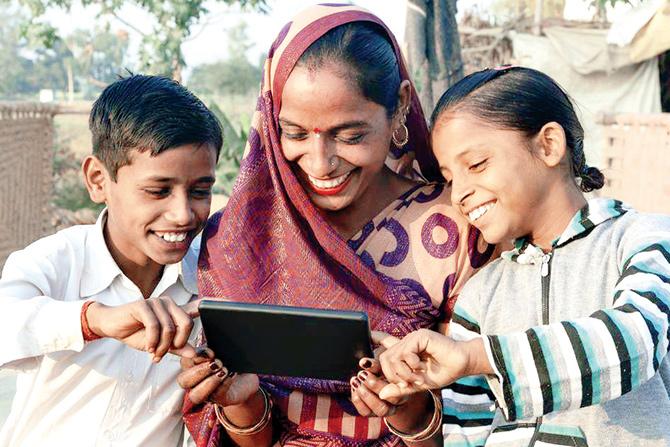Facebook may say it wants to promote Internet in rural India. But, be warned, it’s a clear gimmick to collect data, its main business

While scrolling through your Facebook timeline, if you have been notified about your friends’ appeal for Free Basics to the Telecom Regulatory Authority of India (TRAI), then you are not alone. Free Basics, the revamped version of Internet.org, say social media commentators, is Facebook’s plan to collect user data, under the guise of providing digital equality in the country. Angered by the sly ness of the social media giant to manipulate public opinion and gain support, netizens have raised their voices towards more vigilant usage.

A photo uploaded by Facebook for its Free Basics campaign. Social commentators call it a bluff. PIC/FACEBOOK
Comics voice out
Stand-up comedian collective All India Bakchod (AIB), whose videos raised support for Net Neutrality earlier this year, recently launched another video explaining Facebook’s hidden agenda behind Free Basics. AIB’s Tanmay Bhatt says, “This company’s basic business model is collecting data on people. It doesn’t want India to progress or get connected; it wants to collect data on the one billion people of India. It can’t go to China because she won’t allow it, and India is the next huge market.”
When Facebook’s CEO Mark Zuckerberg was in India in September, he called proponents of Net Neutrality, like Bhatt, a group of few rich and privileged individuals, trying to prevent the Internet from reaching the poor. “That’s a lie,” says Bhatt, adding, “More than 78,000 people (and counting) have written to TRAI against Free Basics. That’s not a small group.”
Image makeover
After the criticism Facebook received this summer, it made a few changes to Internet.org. ClearTrip and Snapdeal (on Internet.org) and Flipkart (on Airtel Zero) had reportedly paid huge amounts to be available as a zero-rated service earlier. This time around, companies who wish to come aboard its plan will not have to pay any amount to Facebook. However, Bhatt says, that too is a lie. “They reserve the right to say no to anyone. And that essentially violates Net Neutrality. Also, I still have some apps for free,” he adds.
Chinmayi Arun, research Director, Centre for Communication Governance, National Law University, Delhi, says the proponents of Net Neutrality have always been in favour of making Internet available to all. “But Facebook wants to offer a gated Internet that offers some information. Our perspective is that it’s a dangerous thing to provide only some information to people. And whether it is a government or a private company, anybody deciding what information is suitable for citizens and what’s not is not right,” she comments.
Facebook has also been pushing Free Basics as a means to achieve the Digital India mission of Prime Minister Narendra Modi.
But isn’t some compromise okay, as long as it makes the Internet available to the poor, who can’t pay for high data charges? Besides, even Facebook has said that they are not against Net Neutrality. “Facebook will say anything to sell its plan,” says Prasanto Roy, media head at Trivone.
For the poor?
Over the last few weeks, Facebook has been promoting its Free Basics plan using hoardings, full-page newspaper ads, videos and various other mediums. Roy estimates that the company would have easily spent more than Rs 100 crores in promoting Free Basics.
“If they really wanted to make Internet available to those who can’t afford it, they would have used the money to subsidise the Internet. If Facebook, Airtel and Reliance want to do charity, the poor could be offered cheaper mobile phone recharges. But no; these companies would rather spend crores to lobby for Free Basics,” adds Roy.
The lobbying for Free Basics is not a new thing. According to some reports, Facebook started it way back in 2013 soon after it posted a vacancy for a political lobbyist based in New Delhi on a social media platform. According to analysts, over the last one and half years, the relationship between the Indian government and Facebook has strengthened as well.
As for Airtel and other TSPs, they always wanted a pie of the revenue earned by OTT services using their network. On several occasions, Airtel as well as Vodafone have written to TRAI asking to formulate a framework that would force OTT service providers like Microsoft, Google, Yahoo as well as start-ups like Flipkart and Snapdeal to share a part of their revenue with TSPs.
“We have to find a way to give affordable Internet to the people, but without compromising its freedom. Clear rules must state it doesn’t throttle some services while giving faster access to others,”
adds Roy.
Warning signs
As per the Unified License Agreement between TSPs and Government of India, TSPs are not to discriminate between content and users. One section of the industry that stands to lose the most is the Indian start-ups. “Zero rating services put the young start-up industry at a disadvantage. This may also hamper the popularity of Internet in India since start-ups in India are the largest generator of local content. Indian start-ups need an open Internet to survive and flourish. Free Basics doesn’t solve the access issue,” warns Chima.
Bhatt says that had a plan like Free Basics existed back in 2006, Facebook would have never been able to become as big as it is today. “So, it’s surprising that it’s now trying to throttle younger companies with its Free Basics Plan,” he adds.
 Subscribe today by clicking the link and stay updated with the latest news!" Click here!
Subscribe today by clicking the link and stay updated with the latest news!" Click here!









